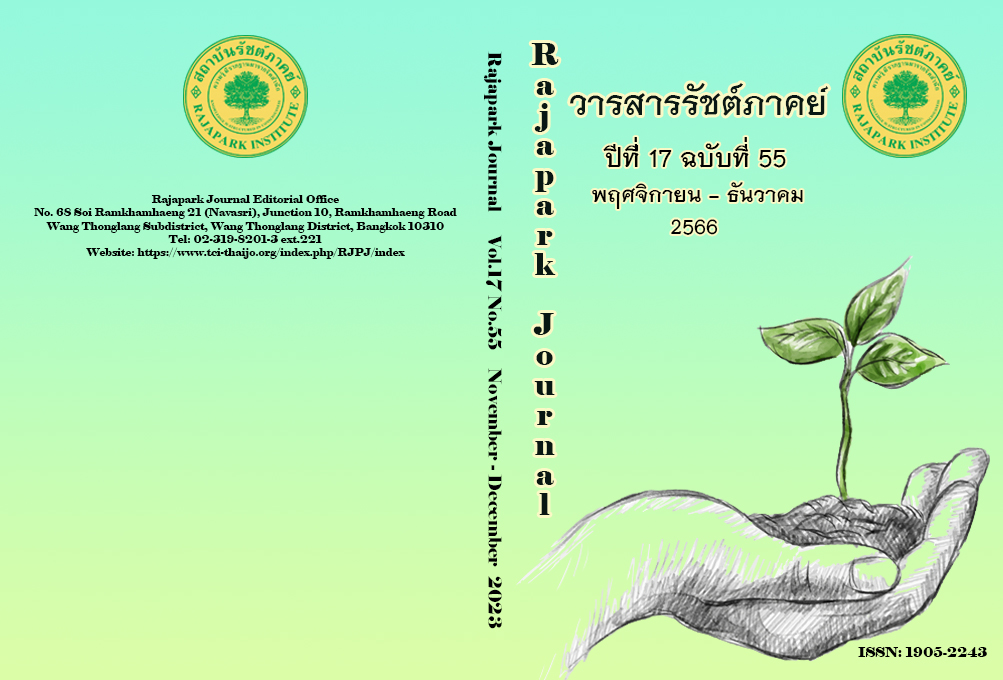The Effects of Creative 3D Paper Folding Activities to Enhance Learning Abilities of Early Childhood Children
Main Article Content
Abstract
The objectives of this research are: 1) to compare the learning of creative 3D paper folding activities that enhance the learning abilities of early childhood children before and after participating in the activities; and 2) to study the satisfaction of early childhood children with creative 3D paper folding activities. The subjects used in this study consisted of 21 students, and they studied in Kindergarten Level 3 in the first semester year of the academic year 2023 at Vudhisarnsuksa Kindergarten, located in Cha-am District, Phetchaburi Province, and managed by the Office of the Private Education Commission. The study instruments included the plan for using creative 3D paper folding activities with the early childhood children 18 times, the learning abilities assessment form for the children after participating in the activities, and the satisfaction assessment form of the children for creative 3D paper folding activities. The research is experimental with a one-group pretest-posttest design. Statistics used in the research include mean, standard deviation, and t-test. The study results showed that: 1) The learning abilities of early childhood children after participating in activities improved overall. The mean was 13.95, the standard deviation was 1.28, with a statistically significant difference of 0.05, and 2) the early childhood children's satisfaction with the overall creative 3D paper folding activities was very high ( = 4.37, S.D. = 0.47).
Article Details

This work is licensed under a Creative Commons Attribution-NonCommercial-NoDerivatives 4.0 International License.
Views and opinions appearing in the Journal it is the responsibility of the author of the article, and does not constitute the view and responsibility of the editorial team.
References
Changmongkol, P. (2010). The Results of Creative Arts Activities with Paper Folding Activities on Social Behavior of Early Childhood Children. Srinakharinwirot University.
Chaosuan, S. (2012). Person of Learning. http://beauten28.blogspot.com/2012/12/blog-post.html.
Choomai, T. (2016). Growth and Development of Early Childhood. Hua Hin Sukjai Klai Kangwon Journal, Hua Hin Medical, 1(2), 18-25. https://he01.tci-thaijo.org/index.php/hhsk/article/view/175062
Dechakupta, Y. (1999). Education Management for Early Childhood Children. AP Graphic Design.
Horadal, A. (2020). How to Teach Young Children Think. Journal Valaya Alongkorn, Humanities and Social Sciences, 10(2), 211-288. https://so06.tci-thaijo.org/index.php/var/article/view/241791
Khaemanee, T., & Pornkul, C. (2001). Development of School Learning Process: A Multi-Case Study (Research Report). Chulalongkorn University.
Supsoognoen, S., Khawlueang, D., & Jaradrawiwat, S. (2020). The Results of Learning Through Collaborative STAD Technique of First Year High Vocational Certificate Accounting Program Students. e-Journal of Education Studies, Burapha University, 2(2), 44-51. https://ojs.lib.buu.ac.th/index.php/ejes/article/view/6903
Lambensa, P. (2016). Quality Determination of Measurement and Evaluation Tools. Yala Rajabhat University.
Office of the Secretariat of the Council of Education. (2017). Research Report on Thai Educational Development Approaches. Preparedness for the 21st century. The Secretariat of the Education Council.
Prakasvudhisarn, K. (2008). Provision of Activities Based on Sufficiency Economy for Preschool Children: A Case Study at Vudhisarnsuksa Kindergarten School Phetchaburi. Kasetsart University.
Prakasvudhisarn, T. et al. (2022). The Early Childhood Curriculum. Vudhisarnsuksa Kindergarten.
Sinthapanon, S. (2018). Teaching and Learning Innovation. To Develop the Skills of Learners in the 21st Century. 9119 Printing Techniques.
Srisa-ard, B. (2013). Preliminary Research (9th ed.). Suweeriyasan.
Srikula, W. (2011). Effects of Using Paper Folding Activities on Basic Mathematical Skills of Preschool Children. Kasetsart University.
Srikula, W., et al. (2017). The Paper Folding Activities’ usage to Promote on Spatial Ability of Preschoolers. Rajabhat Maha Sarakham University.
Sudsang, N. (2016). Research Methodology in Design. Odeon Store.
Tantiphalachewa, K. (2004). Organization of Learning Activities for Early Childhood Children. Edison Press Products.
Tantiphalachewa, K. (2008). Teaching and Learning Model in Early Childhood Education. Brain-Based Books.
Thongmak, S. (2017). The Customer Satisfaction Services Toward Italy Visa Application. Rajamangala University of Technology Krungthep.
Traimongkolkul, P., & Chatraporn, S. (2006). Research Design. Kasetsart University.


